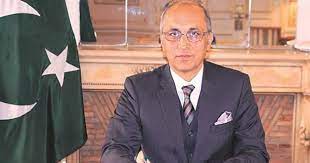BEIJING, December 12: : Pakistan Ambassador to China Moin ul Haque has highlighted the role of the academia and think tanks in China-Pakistan relations, saying that diplomacy plays a leading role in shaping the contours of international relations, but it cannot perform this gigantic task alone.
He made the remarks via video link at the opening ceremony of the “70th Anniversary Symposium of the Establishment of Diplomatic Relations between China and Pakistan,” hosted by Tsinghua University’s International Center for Communication Studies and organized by the Centre for Pakistan Culture and Communication, China Global Television Network (CGTN) reported.
“The role of the think tanks and academic circles to make a faithful record of our bilateral ties, identify new areas of international cooperation, and explore the complex matrix of economics, politics and culture can never be underestimated,” said Haque, highlighting the role of the universities working in this area across China and Confucius Institutes in Pakistan.
Moreover, he thanked China for standing by Pakistan during testing times, including the fight against Covid-19. “The vaccine campaign which is going [on] in Pakistan, 90 percent of it is being done through vaccines provided by China,” he said.
The ambassador also explained the benefits brought by the China-Pakistan Economic Corridor (CPEC). “CPEC has contributed immensely to Pakistan’s national development by upgrading its physical infrastructure, communication and transport infrastructure, addressing our acute energy needs, and developing the Gwadar Port,” he said, adding that the focus was to follow a “people-centric approach for socioeconomic development”.
Also speaking on the occasion, Peng Gang, vice president of Tsinghua University, said China and Pakistan share similar traditional cultural philosophy and have the same pursuit of a community of shared future for mankind.
In this regard, he highlighted a similarity of thought between Pakistan’s national poet Muhammad Iqbal and Chinese philosopher Confucius. “The true unity of the peoples in the world shall blossom,” he quoted Iqbal, followed by Confucius’ saying that “all men are brothers.”
Senator Mushahid Hussain Sayed, director of Pakistan-China Institute, spoke about the significance of cultural and media exchanges benefiting CPEC. He also stressed the need of having a “Pakistan-China cultural corridor,” to enhance connectivity between the two peoples, think tanks and academia, and among media.
Speaking of the ties, he said, China-Pakistan relationship stands out as a “model for good neighborly cooperation” and it is so unique because it is “not transactional, not tactical, and it is not against anybody.”
Explaining the strong and deep-rooted relationship between the two countries, Hussain noted that this year also marked 50 years of the historic secret flight by American statesman Dr Henry Kissinger to Beijing via Pakistani capital Islamabad in July 1971. He explained how Pakistan acted as a bridge to realize normalization of China-U.S. ties, which became a turning point in global politics.
Recounting some of the key CPEC indicators, Hussain said Chinese investment worth $25 million had come in since the launch of the project, which had also given jobs to 75,000 Pakistanis.-DNA
- Latest
- Trending



